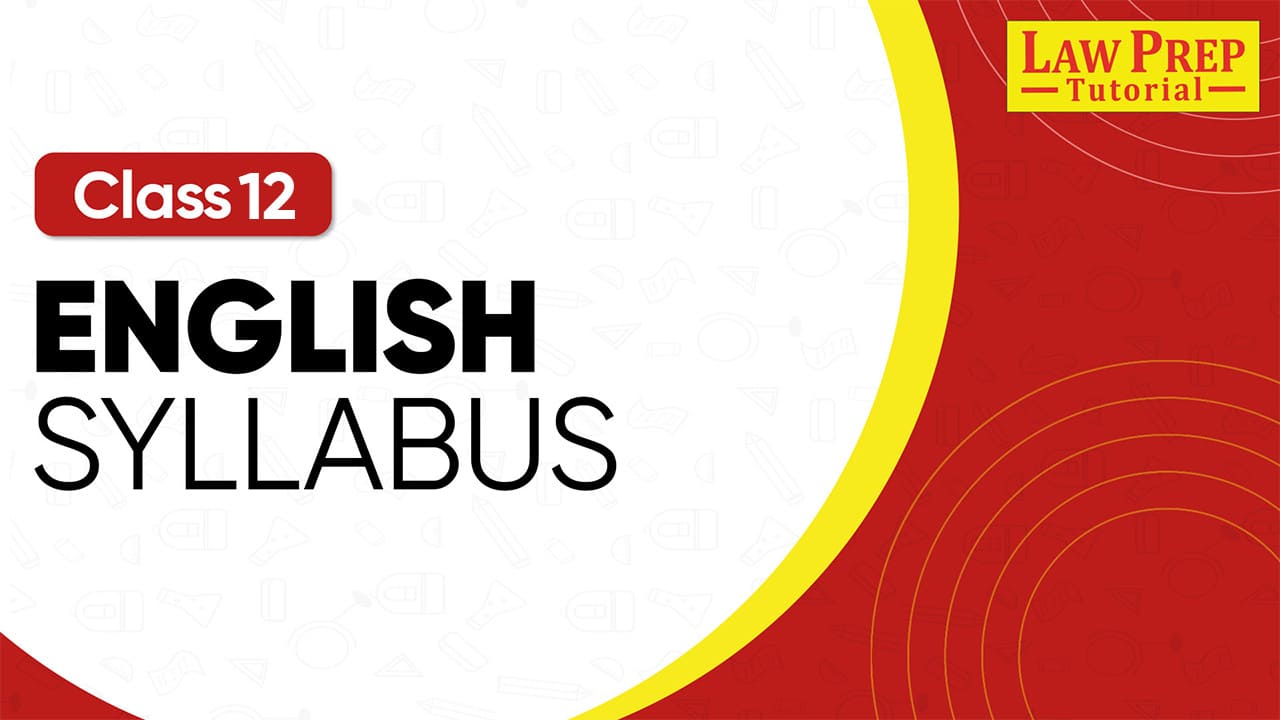If you are preparing for your board exams, understanding the Class 12 English Syllabus is the first step. English is not only a scoring subject but also plays a key role in developing communication, writing, and analytical skills.
We have given you a clear breakdown of the syllabus of Class 12 English in CBSE Board, including English Core and Elective. You will find details of prescribed books, exam pattern, marking scheme, and internal assessments. This will help you plan your studies better and approach the subject with confidence.
Are you a law aspirant? Get up to 100% scholarship on India’s number 1 online CLAT coaching.
Class 12 English Syllabus: Overview
Find a quick overview of the syllabus of class 12th English subject:
| Section | Marks | Components |
| Reading Skills | 22 | Unseen Passage + Case-based Passage |
| Creative Writing Skills | 18 | Notice, Invitations & Replies, Letters, Article/Report |
| Literature (Flamingo & Vistas) | 40 | Prose, Poetry, Supplementary Texts |
| Internal Assessment | 20 | Listening (5), Speaking (5), Project Work (10) |
Download Class 12 English Syllabus PDF
Download the complete CBSE Class 12 English Syllabus 2026-27 PDF and keep it for quick reference.
Class 12 English Syllabus 2026-27 (Core)
The English syllabus of Class 12th in CBSE is designed to strengthen reading comprehension, writing, and literary analysis. It is divided into four main components:
1. Reading Skills – 22 Marks
This section tests your ability to understand, interpret, and analyze unseen texts.
Unseen Passage (12 Marks)
- About 400–500 words, can be factual, descriptive, or literary.
- 12 multiple-choice or short questions to test vocabulary, comprehension, inference, and analysis.
Case-based Factual Passage (10 Marks)
- Based on charts, data, or statistical inputs (word limit: 200–250 words).
- Tests interpretation, evaluation, and application skills.
Focus: Practice reading newspapers, editorials, and factual reports to build speed and comprehension.
2. Creative Writing Skills – 18 Marks
This section evaluates your ability to express ideas in a structured and creative format.
Notice Writing (4 Marks)
- Up to 50 words.
- Must include proper format, clarity, and concise information.
Formal/Informal Invitation and Reply (4 Marks)
- Up to 50 words.
- Examples: wedding invitations, official event invitations, or personal party invites.
Letter Writing (5 Marks)
- About 120–150 words.
- Types: Application for a job with resume, Letter to the Editor (suggestions, opinions, public issues).
- Marking scheme: Format (1), Ideas & Content (2), Language & Accuracy (2).
Article/Report Writing (5 Marks)
- About 120–150 words.
- Analytical or descriptive, based on verbal/visual input.
- Focus on presenting facts, opinions, and logical flow.
3. Literature – 40 Marks
The literature section is based on two prescribed NCERT books – Flamingo and Vistas.
It tests comprehension, critical appreciation, and extrapolation skills.
(a) Flamingo – Prose
- The Last Lesson (Alphonse Daudet)
- Lost Spring (Anees Jung)
- Deep Water (William Douglas)
- The Rattrap (Selma Lagerlöf)
- Indigo (Louis Fischer)
- Poets and Pancakes (Asokamitran)
- The Interview (Christopher Silvester)
- Going Places (A.R. Barton)
(b) Flamingo – Poetry
- My Mother at Sixty-Six (Kamala Das)
- Keeping Quiet (Pablo Neruda)
- A Thing of Beauty (John Keats)
- A Roadside Stand (Robert Frost)
- Aunt Jennifer’s Tigers (Adrienne Rich)
(c) Vistas – Supplementary Reader
- The Third Level (Jack Finney)
- The Tiger King (Kalki)
- Journey to the End of the Earth (Tishani Doshi)
- The Enemy (Pearl S. Buck)
- On the Face of It (Susan Hill)
- Memories of Childhood (Zitkala-Sa & Bama)
- The Cutting of My Long Hair
- We Too Are Human Beings
Question Types:
- Extract-based questions (Poetry & Prose).
- Short Answer Questions (40–50 words).
- Long Answer Questions (120–150 words) requiring analysis, interpretation, and personal opinions.
4. Internal Assessment – 20 Marks
Apart from theory, English Core includes an internal evaluation component.
Listening Skills – 5 Marks
- Students will listen to audio passages and answer questions to check comprehension.
Speaking Skills – 5 Marks
- Activities like declamation, group discussions, speeches, role plays, or debates.
Project Work – 10 Marks
- Research-based work on literary themes, social issues, or interdisciplinary projects.
- Includes a viva presentation for assessment.
Focus: Develop communication skills, pronunciation, fluency, and confidence.
More Important Resources for CBSE Exam:
| Class 11th Hornbill Syllabus | CBSE Class 11th Commerce Subjects |
| CBSE Full Form | All about CBSE Class 11th |
| Class 11th Syllabus | Class 12th Syllabus |
| Class 11th Commerce Books | CBSE Board: All details |
Class 12 English Syllabus 2026-27 (Elective)
The English Elective subject (Code 001) is designed for students who wish to study English in depth, with a focus on literature, critical appreciation, and advanced writing skills. The syllabus encourages creativity, reasoning, and interpretation, while exposing students to world literature and Indian writing in English.
1. Reading Comprehension – 20 Marks
Unseen Passage (12 Marks)
- About 950–1000 words.
- Tests comprehension, vocabulary, inference, and analysis.
Poem-based Questions (4 Marks)
- Poem of 10–12 lines.
- Interpretation, inference, and appreciation.
Case-based Factual Passage (4 Marks)
- Around 100–120 words with charts, data, or visuals.
- Focus on interpretation, analysis, and evaluation.
2. Applied Grammar – 8 Marks
- Multiple-choice/objective questions based on sentence transformation.
- Focus: accuracy, application of grammar rules, and fluency.
3. Creative Writing – 20 Marks
Discursive/Interpretative Writing (3 tasks × 5 Marks = 15)
- 120–150 words each.
- Analytical essays, interpretative passages, or reflective writing.
Essay on Contemporary Issues (1 task × 5 Marks = 5)
- Article/Report/Speech on social or topical issues.
4. Literature – 22 Marks
Questions based on the prescribed NCERT book Kaleidoscope.
- Reference to Context (2 extracts, prose & poetry, 6 marks each = 12).
- Short Answer Questions (30–50 words, 2 + 3 marks).
- Long Answer Question (120–150 words, 5 marks).
Assessment: Literary appreciation, critical thinking, interpretation, and creativity.
5. Fiction – 10 Marks
Students can choose one of the following novels:
- A Tiger for Malgudi by R.K. Narayan
- The Financial Expert by R.K. Narayan
Question types: Short answer (2 + 3 marks) and one long answer (5 marks).
6. Seminar – 20 Marks
| Activity | Details |
| Book Review | Novel / Play / Short Story / Novella |
| Poetry Reading | Recitation followed by analysis |
| Critical Review | Film or Play review |
| Theatre Workshop | Workshop followed by group discussion |
- Assessment Parameters: Presentation, articulation, reasoning, diction, fluency
- Prescribed Book: Kaleidoscope (NCERT)
| Category | Contents |
| Short Stories | I Sell My DreamsEvelineA Wedding in Brownsville |
| Poetry | A Lecture Upon the ShadowPoems by MiltonPoems by BlakeKubla KhanTreesThe Wild Swans at CooleTime and Time Again |
| Non-Fiction | Freedom The Mark on the Wall Film-makingWhy the Novel MattersThe Argumentative Indian |
| Drama | Chandalika |
Read the chapter-wise summaries of Class 11 English here:
Tips to Study Class 12th English Syllabus
1. Understand the Complete Syllabus
Before starting, go through the Class 12th English Syllabus carefully. Divide it into Reading, Writing, and Literature sections. Knowing what is included in the syllabus of Class 12th English helps you plan and manage your time effectively.
2. Strengthen Reading Comprehension
Practice unseen passages daily. Focus on speed, vocabulary, and identifying the main idea quickly. Reading newspapers and editorials will sharpen your comprehension skills, which are important for the reading section.
3. Practice Writing Skills Regularly
Dedicate time to practice notices, letters, articles, and reports. Stick to the word limit and correct format. Regular writing practice will help you score well and improve expression.
4. Learn Literature with Analysis
While studying Flamingo and Vistas, don’t just memorize summaries. Analyze characters, themes, and moral lessons. Relating stories and poems to real-life situations makes them easier to recall in exams.
5. Prepare Notes for Quick Revision
Create short notes for each chapter and poem in the Class 12th English Syllabus. Include key points, important quotes, and author names. These notes are very useful during last-minute revision.
6. Focus on Internal Assessment
Don’t ignore listening, speaking, and project work. These carry 20 marks and can boost your overall score. Practice speaking fluently, prepare small presentations, and work sincerely on your project.
7. Solve Sample Papers & Previous Year Papers
Practice CBSE sample papers and past board questions. This will help you understand exam patterns, improve time management, and identify your weak areas.
Find detailed questions and answers from all chapters of English Class 11 now:
FAQs About Class 12th English Syllabus
The subject code for English Core in Class 12 is 301.
The theory exam is of 80 marks and internal assessment is 20 marks, making a total of 100 marks.
Reading Skills, Creative Writing Skills, Literature, and Internal Assessment.
Two books – Flamingo (Prose & Poetry) and Vistas (Supplementary Reader).
Kaleidoscope (short stories, poetry, non-fiction, drama) and a choice of novel (A Tiger for Malgudi or The Financial Expert).
There are five poems in Flamingo.
Vistas has six chapters, including one with two parts under Memories of Childhood.
Notices should be written in up to 50 words.
Listening Skills (5 marks), Speaking Skills (5 marks), and Project Work (10 marks).
Students listen to an audio passage and answer related questions.
Projects may include book reviews, interviews, theatre performances, or reports on contemporary issues.
Check the latest CBSE Class 11 syllabus for all subjects below:
Explore the updated CBSE Class 12 syllabus for all subjects here:
Discover CLAT exam resources that can help you get started early:
Explore CLAT coaching centers across different cities:


